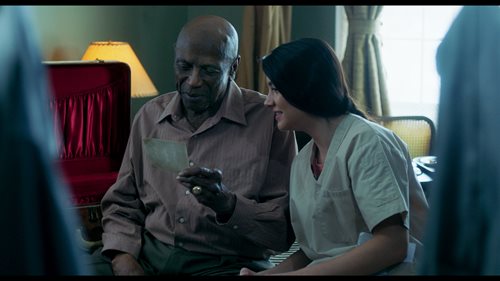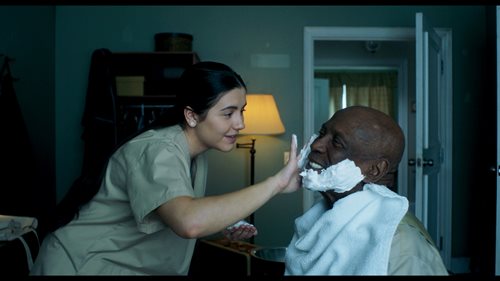Music has always been a huge part of the lives of Oscar-winning actor Louis Gossett Jr. and singer-actress Ana Golja, who star in the upcoming film “The Cuban.” Gosset Jr. portrays a celebrated Cuban musician living with Alzheimer’s who creates a friendship — forged by the power of music and imagination — with his nurse, played by Golja.
Music can be a powerful force in the lives of those living with Alzheimer’s disease. Studies have shown that music may improve behavioral issues common in the middle-stages of the disease. A person in the late stage of Alzheimer’s may even still be able to sing lyrics to a song from their childhood.
Read on to learn more from Louis and Ana as we share how the power of music brings people from all walks of life together in harmony.
“The Cuban” shows how the power of the past can reignite the music inside of us. What does music mean to you, and the music from the film?
Ana: Music has certainly played a big part in getting me through the COVID-19 pandemic. I have been inspired to spend my time writing and recording.

The music in the closing scene of our film really tied everything together. There is something so special about the Cuban culture that we were able to capture on camera. The scene was filmed in Cuba, where Louis’ character has so many fond memories. Sergio, our director, just let the musicians riff, and did they! He captured that magic of them in their element, and it paid off in spades. The music and the spirit is infectious.
Louis: Before there were words, sound was how people communicated. To me, music
is the universal sound that brings people together.
There are a few scenes in the film where my character hears music and springs to life; he goes from 1 to 100 when the music starts. It was a very interesting experience as an actor, going back and forth from being hyper-aware to being a bit lost in the moment.
People in the late stage of Alzheimer’s do not have control of when they are present in the moment. They may drift in and out of their memories, and that is evident in the film, as my character drifts from the music moments of the present to the magical times of his past life at the Copacabana dance club in Cuba. It is touching, it is sad, it is magical, all at the same time.
Ana, how did you draw from your personal experience with Alzheimer’s to inform your performance?
Ana: My inspiration for getting involved in this film was due to my great-grandmother, who is 93 and living with Alzheimer’s. I saw first hand how music brought her to life, even in her more difficult moments with the disease.

When looking for resources for caregiving support, we were faced with a language barrier. She speaks Albanian and Yugoslavian, and not many caregivers with those language capabilities were available to us. It was up to us as a family to come together and take care of our own, four generations of women under one roof.
Regardless of what your situation or reality looks like, I've learned that the most important thing is to be a strong family unit. Always treat your loved ones with tender love and care.
Which musical scenes you shared together were most special to you?
Ana: Louis comes from an unparalleled generation of actors and brings other actors into every moment of a scene with ease. The anxiety I had going into the performance disappeared almost immediately. He charmed everyone during filming, especially me!
One of my favorite scenes in the film is the first time we see Louis’ character truly come to life through the music as his character and mine bond over a jazz poster on the wall of his nursing home room. [When Ana’s character begins to speak to Louis’ character, he doesn't respond verbally. She begins to talk about his poster and how her grandparents sang and played music, in an effort to engage with him.] It was an exciting moment for me as an actor, too, witnessing Louis’ greatness. That particular music moment really helps shape the arc of the story, as it is the first moment where we see how music really affects him and helps him engage with the people around him. He stands up, recalling snippets of fond memories that were buried, dancing to the music.
Louis: “Todas las mujeres quieren bailar conmigo” = All of the girls wanted to dance with me! I have music built into my system. The idea of going back and forth in this film from being a man unable to communicate who then comes alive as the music he loves plays was a very exciting challenge as an actor. I knew this was going to be a role worth taking on. I really wanted to give justice to my character and depict his disease and his emotions properly. And it was my pleasure to have Ana as my leading lady.
What I’ve learned is that music is such a connective tissue. I started performing music at age 15. In high school, I danced Cha Cha Cha, Merengue, Mambo, Bachata. I knew this music very well. With the ambiance of Cuban music as an inspiration, I was able to reference these moments from my past to help bring that joy to the scene.
From African music to the music of Ray Charles and the blues to the celebratory songs I’ve learned from the Native American culture — music and dance keep us together. And it doesn’t have to be a birthday or a holiday: simply sitting at the dinner table enjoying a night with family, music is always there. Music allows us to celebrate even when there is nothing to celebrate.
Ana: I grew up in a household where music was everywhere all the time, and not just one kind of music. My family has diverse roots, and we listened to everything from upbeat Latin music to smoky jazz.
I have a lot of fond memories and a special connection to Albanian music. Seeing how it positively affects my great-grandmother has been a joy.
What message do you have for families affected by Alzheimers and dementia?
Louis: We need to take care of each other. We need to care for people from their youth through middle age and throughout their lives. We need to care for the older population.
I was raised around a lot of different cultures — Polish, Italian, Irish — and one idea united us all: keep your family unit tight and respect your elders. The older people in our families are so vital to the family unit as a whole. Let’s give them the respect they deserve.
When you are part of a repressed society, you must pay attention to things that are unchanged. I was raised by my great-grandmother, a former slave, who had a quiet strength, something she passed on to me and my cousins. She lived to be 117 years old. That strength and her unwavering hope carries me through.
In my life, I've learned that it takes mankind to save mankind. Seeing the impact of civil rights icons John Lewis and Rev. “C.T." Vivian, recalling all my personal Black heroes who started out as young activists — these people and these movements continue to inspire me as an artist.
Most importantly, in the times we are all living through: Eat breakfast, spend time with your pets, be grateful for each day you have on this planet. Seize the day, and keep the music playing.
Ana: I couldn’t agree more!
Directed by Sergio Navarretta, “The Cuban” is now available on digital platforms and VOD in the U.S., including Apple TV, Amazon, Fandango Now, Vudu, Google Play, Vimeo, and a variety of cable platforms. Check your cable provider for more information.
About Louis Gossett Jr.: Best known for his Academy Award-winning performance in "An Officer and a Gentleman”, Louis Gossett Jr. is a long-respected actor of stage, screen and television. With a career spanning over seven decades, his many accolades include an Emmy Award for his role as Fiddler in the 1977 miniseries “Roots”. Gossett is nominated for a 2019-2020 Emmy Award for his supporting role in HBO’s “Watchmen.”
About Ana: Ana Golja starred as Zoë Rivas in the TV series “Degrassi: Next Class”. She also starred as Ariana Berlin in the TV biopic “Full Out: The Ariana Berlin Movie”, based on the life story of the American gymnast. Ana received a 2016 Canadian Screen Awards nomination for Best Performance in a Children’s or Young Program or Series for her performance.
Related articles:
Art, Music and Alzheimer’s
Alzheimer’s Association Music Moments